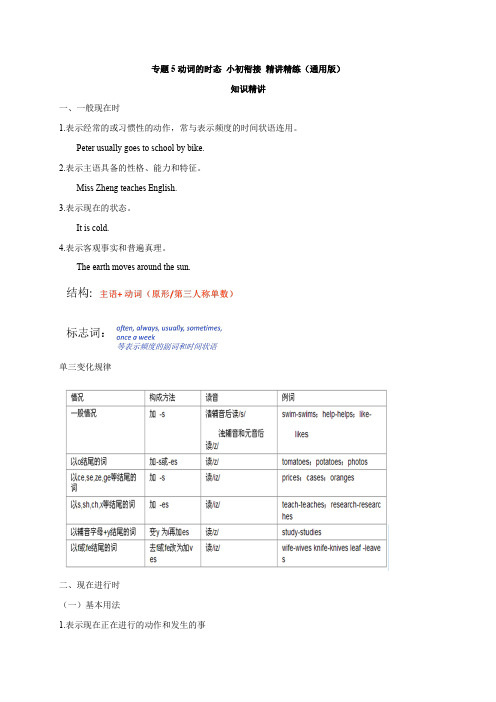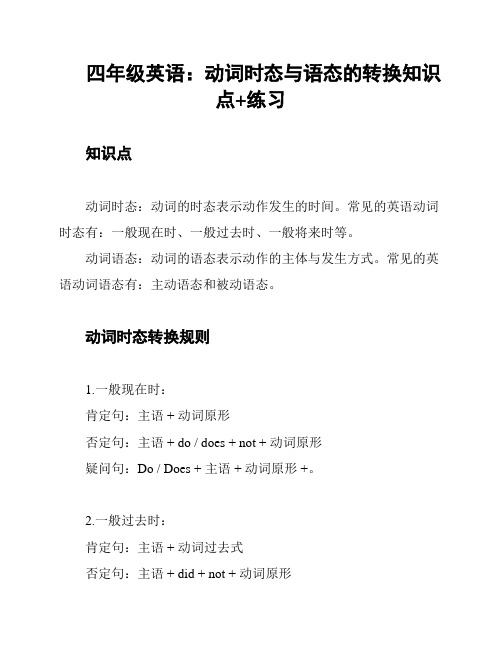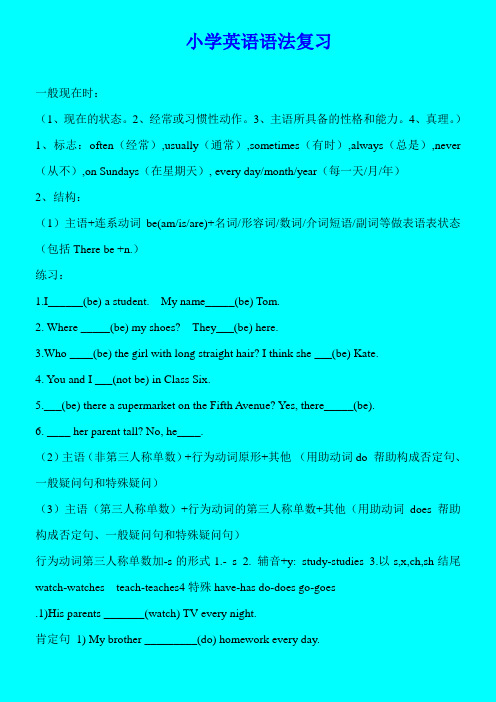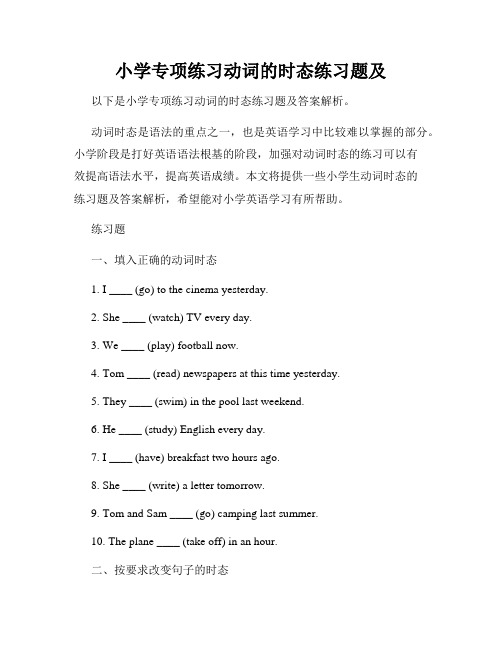(完整版)小学英语语法复习动词时态专项讲解和练习
【动词的时态】小初英语衔接 知识精讲+即学即练(通用版 含答案)

专题5动词的时态小初衔接精讲精练(通用版)知识精讲一、一般现在时1.表示经常的或习惯性的动作,常与表示频度的时间状语连用。
Peter usually goes to school by bike.2.表示主语具备的性格、能力和特征。
Miss Zheng teaches English.3.表示现在的状态。
It is cold.4.表示客观事实和普遍真理。
The earth moves around the sun.单三变化规律二、现在进行时(一)基本用法1.表示现在正在进行的动作和发生的事Eg. ---What are you doing?---I am reading a book.2.有时表示现阶段正发生的事,但此刻动作不一定正在进行Eg. He is teaching at the school.We are learning Unit5 these days.3.现在进行时的句子中常有now,或在句首常出现Look! Listen!等提示词Eg. Listen! Danny is singing in the room.He is doing his homework now.(二)结构: be+doing ( be要根据主语作人称和数的变化)(三)句型转换1.肯定句转换成否定句,要在be 后加not 构成eg. We are reading English now.✂We are not reading English now.2.陈述句转换成一般疑问句,把be动词提到句首eg. The student is drinking.✂ Is the student drinking?3.陈述句转换成特殊疑问句,由“疑问词+一般疑问句”构成eg. He is working.✂ What is he doing?助记口诀:doing进行时很好记,be加动词-ing;直加双写去哑e,分词构成须仔细;别说be 无词义,主语和它最亲密;变疑问be 提前,否定not 再后添;何时要用进行时look,listen,now标记.三、一般过去时(simple past tense)(一)基本用法:表示•过去某个时间里发生的动作或状态;•过去习惯性、经常性的动作、行为;•过去主语所具备的能力和性格。
四年级英语:动词时态与语态的转换知识点+练习

四年级英语:动词时态与语态的转换知识点+练习知识点动词时态:动词的时态表示动作发生的时间。
常见的英语动词时态有:一般现在时、一般过去时、一般将来时等。
动词语态:动词的语态表示动作的主体与发生方式。
常见的英语动词语态有:主动语态和被动语态。
动词时态转换规则1.一般现在时:肯定句:主语 + 动词原形否定句:主语 + do / does + not + 动词原形疑问句:Do / Does + 主语 + 动词原形 +。
2.一般过去时:肯定句:主语 + 动词过去式否定句:主语 + did + not + 动词原形疑问句:Did + 主语 + 动词原形 +。
3.一般将来时:肯定句:主语 + will + 动词原形否定句:主语 + will + not + 动词原形疑问句:Will + 主语 + 动词原形 +。
其他时态的转换规则可以参考相关教材。
动词语态转换规则1.主动语态:肯定句:主语 + 动词原形 / 动词时态否定句:主语 + do / does / did + not + 动词原形 / 动词时态疑问句:Do / Does / Did + 主语 + 动词原形 / 动词时态 +。
2.被动语态:肯定句:主语 + am / is / are / was / were + 过去分词否定句:主语 + am / is / are / was / were + not + 过去分词疑问句:Am / Is / Are / Was / Were + 主语 + 过去分词 +。
练题1.把下列句子改成一般现在时的否定句:I like apples。
-。
I do not like apples.___ to music。
-。
She does not listen to music.2.把下列句子改成一般过去时的疑问句:___。
-。
Did they play basketball?___。
-。
Did I watch a movie yesterday。
小学英语时态讲解及练习可直接.docx

小学英语语法【一】一般现在时一般现在时基本用法介绍一、一般现在时的功能1.表示事物或人物的特征、状态。
如:The sky is blue.天空是蓝色的。
2.表示经常性或习惯性的动作。
如:I get up at six every day.我每天六点起床。
3.表示客观现实。
如: The earth goes around the sun.地球绕着太阳转。
一般现在时用法练习一、出下列动词的第三人称单数drink ________ go _______ stay________ make ________look _________ have_______ pass_______ carry ____ come________ watch______ plant_______fly ________study_______ brush________ do______ teach_______ likeplay read wash be二、用括号内动词的适当形式填空。
1.He often ________(have) dinner at home.2.Daniel and Tommy _______(be) in Class One.3.We _______(not watch) TV on Monday.4.Nick _______(not go) to the zoo on Sunday.5.______ they ________(like) the World Cup?6.What _______they often _______(do) on Saturdays?7._____ your parents _______(read) newspapers every day?8.The girl _______(teach) us English on Sundays.9.She and I ________(take) a walk together every evening.10.There ________(be) some water in the bottle.11.Mike _______(like) cooking.12.They _______(have) the same hobby.13.My aunt _______(look) after her baby carefully.14.You always _______(do) your homework well.15.I _______(be) ill. I’m staying in bed.16.She _______(go) to school from Monday to Friday.17.Liu Tao _______(do) not like PE.18.The child often _______(watch) TV in the evening.19.Su Hai and Su Yang _____(have) eight lessons this term.20. - What day _____(be) it today?-It’s Saturday.三、按照要求改写句子2.I do my homework every day.(改为一般疑问句,作否定回答)_____________________________________________________3.She likes milk.(改为一般疑问句,作肯定回答)__________________________4.Amy likes playing computer games.(改为一般疑问句,作否定回答)___________________________________6.He speaks English very well.(改为否定句)_______________________________________________7.John comes from Canada.(对划线部分提问)_______________________一般现在时练习1. He often(have) dinner at home.2. Daniel and Tommy(be) in Class One.3. We(not watch) TV on Monday.4. Nick(not go) to the zoo on Sunday.5.they(like)the World Cup?6. What they often(do) on Saturdays?7.your parents(read)newspapers every day?8. The girl(teach)us English on Sundays.9. She and I(take) a walk together every evening.10. There(be) some water in the bottle.小学英语语法【二】现在进行时现在进行时1.现在进行时表示现在正在进行或发生的动作,也可表示当前一段时间内的活动或现阶段正在进行的动作。
小学英语语法复习动词时态专项讲解和练习

小学英语语法复习一般现在时:(1、现在的状态。
2、经常或习惯性动作。
3、主语所具备的性格和能力。
4、真理。
)1、标志:often(经常),usually(通常),sometimes(有时),always(总是),never (从不),on Sundays(在星期天), every day/month/year(每一天/月/年)2、结构:(1)主语+连系动词be(am/is/are)+名词/形容词/数词/介词短语/副词等做表语表状态(包括There be +n.)练习:1.I______(be) a student. My name_____(be) Tom.2. Where _____(be) my shoes? They___(be) here.3.Who ____(be) the girl with long straight hair? I think she ___(be) Kate.4. You and I ___(not be) in Class Six.5.___(be) there a supermarket on the Fifth Avenue? Yes, there_____(be).6. ____ her parent tall? No, he____.(2)主语(非第三人称单数)+行为动词原形+其他(用助动词do 帮助构成否定句、一般疑问句和特殊疑问)(3)主语(第三人称单数)+行为动词的第三人称单数+其他(用助动词does 帮助构成否定句、一般疑问句和特殊疑问句)行为动词第三人称单数加-s的形式1.- s 2. 辅音+y: study-studies 3.以s,x,ch,sh结尾watch-watches teach-teaches4特殊have-has do-does go-goes.1)His parents _______(watch) TV every night.2)His parents _________(not watch) every night.否定句2)My brother________(not do)homework every day.3)_____his parents_____(watch) TV every night?一般疑3)______ your brother _____ homework every day?Yes, they _______. No, they _______.Yes, he______. No, he _________.4)When___ his parents _____(watch) TV?特疑4)When _____ your brother ____(do) homework?5)They watch TV every night.He does homework every day.二.现在进行时:表示说话瞬间或现阶段正在进行的动作。
小学专项练习动词的时态练习题及

小学专项练习动词的时态练习题及以下是小学专项练习动词的时态练习题及答案解析。
动词时态是语法的重点之一,也是英语学习中比较难以掌握的部分。
小学阶段是打好英语语法根基的阶段,加强对动词时态的练习可以有效提高语法水平,提高英语成绩。
本文将提供一些小学生动词时态的练习题及答案解析,希望能对小学英语学习有所帮助。
练习题一、填入正确的动词时态1. I ____ (go) to the cinema yesterday.2. She ____ (watch) TV every day.3. We ____ (play) football now.4. Tom ____ (read) newspapers at this time yesterday.5. They ____ (swim) in the pool last weekend.6. He ____ (study) English every day.7. I ____ (have) breakfast two hours ago.8. She ____ (write) a letter tomorrow.9. Tom and Sam ____ (go) camping last summer.10. The plane ____ (take off) in an hour.二、按要求改变句子的时态1. She goes to school every day. (变成过去式)2. He is playing basketball now. (变成一般疑问句)3. The students will read books tomorrow. (变成否定句)4. They were watching TV at 8:00 last night. (变成一般疑问句)5. I have finished my homework. (变成现在进行时)6. She had cleaned the room before her parents came back. (变成一般疑问句)7. They will have a meeting at 10 o'clock. (变成一般疑问句并做否定回答)8. I am going to visit my grandparents this weekend. (变成过去进行时)9. We usually eat breakfast at 8:00. (变成一般疑问句)10. The children have learned a lot in this school. (改为否定句)答案解析一、填入正确的动词时态1. went2. watches3. are playing4. was reading5. swam6. studies7. had8. will write9. went10. will take off二、按要求改变句子的时态1. She went to school every day.2. Is he playing basketball now?3. The students will not read books tomorrow.4. Were they watching TV at 8:00 last night?5. I am finishing my homework.6. Had she cleaned the room before her parents came back?7. Will they have a meeting at 10 o'clock? No, they won't.8. I was going to visit my grandparents that weekend.9. Do we usually eat breakfast at 8:00?10. The children haven't learned a lot in this school.本篇文章提供了小学生动词时态的练习题及答案解析,帮助小学生们加强对动词时态的练习,提高英语语法水平。
小学英语语法时态归纳及练习(含答案解析)

英语时态归纳一、一般现在时:标志词:often(经常) sometimes(有时) always(总是) usually(通常) never(从不) every(每一)行为动词词型变化形式:一般现在时动词只有第三人称有词形变化;其他人称(第一人称:I, we;第二人称:you;第三人称复数:they、my friends)动词均用原形。
当主语是第三人称单数时,一般动词在一般现在时句子中的变化规律:1、多数在动词后加s:play—plays like—likes ,2、以s,x,sh,ch,o结尾的动词加es wash–washes catch–catches do–does3、以辅音字母加y结尾,把y改i再加es fly—flies study—studies4、以元音字母加y结尾,直接加s buy – buys5、不规则变化have—has一般现在时基本用法功能1.表示事物或人物的特征、状态。
如:The sky is blue.天空是蓝色的。
2.表示经常性或习惯性的动作。
如:I get up at six every day.我每天六点起床。
3.表示客观现实。
如:The earth goes around the sun.地球绕着太阳转。
The earth is round.构成1. be动词:主语+be(am,is,are)+其它。
如:I am a boy.我是一个男孩。
2.行为动词:主语+行为动词(+其它)。
如:We study English.我们学习英语。
句型肯定句:A.be动词:主语+ be + 其它成分He is a worker.B.行为动词:主语+动词(注意人称变化) +其它成分We like the little cat.否定句:A.be动词:主语+ be + not+其它成分They are not students.B.行为动词:主语+助动词(do/does) + not+动词原形+其它成分We don’t like the little cat.一般疑问句:A.be动词:Am / Is /Are +主语+ 其它成分Are you a teacher? Yes, I am. / No, I am not.Are they students of your school. Yes, they are / No they aren’t.B.行为动词:助动词(Do/Does)+主语+动词原形+ 其它成分Do you like it? Yes, I do. / No. I don’t .Does he(she) like it? Yes, he( she )does. / No, he ( she )doesn’t.特殊疑问句:疑问词+ 一般疑问句A.be动词:How many students are there in your school?B.行为动词:What do you usually do on Sunday?一般现在时动词be和have的变化形式1.动词Be 叫连系动词, 用法:第一人称单数用am,第三人称单数用is,其它人称用are。
小学英语各种时态综合讲解与练习

小学时态综合讲解与练习一、一般现在时的用法A、当谓语是be动词时,构成为:主语+be动词( am, is, are )+其他。
如:I am a student.B、当谓语是行为动词时,构成有两种:(1)主语(非第三人称单数)+动词原形+其他。
如:We often watch TV at the weekends.(2)主语(第三人称单数)+动词第三人称单数形式+其他。
如:Jim usually goes to the park on Sundays.C、句型变换:肯定句否定句一般疑问句及回答They watch TV at six everyday. They don’t watch TV at six everyday.---Do they watch TV at six everyday.---Yes, they do. / No, they don’t.She watches TV at six everyday. She doesn’t watch TV at six everyday.---Does she watch TV at six everyday.1.“是”动词的现在式是:am,is和are。
其用法如下(1) I a teacher.(2) You a student.(3) He a worker2.“有”动词的现在式是:have (got)或has (got)(1) I a book. I ( not) a book.(2) He a radio. He (not) a radio3.如果主语是第三人称单数,谓语动词要用第三人称单数形式,如果主语是其他人称,谓语动词用动词原形。
如:We study English well. He studies English well.(1) She (like) playing football(2) WangHua (love) animals very much.(3) I ( enjoy) watching TV every weekend.(4) We (play) football every day二、什么情况下用一般现在时?1.表示经常性或习惯性的反复发生的动作(1) Sometimes she ( go) to see a film in the evening(2) How do you usually ( come) to school?(3) He often (watch) TV on Saturdays2.表示现在的状态或特征(1) This book (be) easy to read.(2) Lily (draw) well.(3) It often ( rain) here in summer(4) I ( have) a dictionary3.表示客观事实或普遍真理:(1) Winter (be) colder than summer in China(2) The earth ( move) round the sun.(3) The sun (rise) in the east and (set)(落下)in the west.(4) The light (travel) much faster than the sound.(5) Shanghai (be) in the east of China4.常与一般现在时连用的时间状语有:often, sometimes, usually, always, every day( week, year, month) on Sundays, in the morning( afternoon, evening)等。
小学英语四种时态的综合讲解及练习

一般将来时:定义:一般将来时表示将来某一时刻的动作或状态,或将来某一段时间内经常的动作或状态。
构成:(1)be going to + 动词原形(2)will/shall + do用法:1)表示将来的动作或状态一般将来时常与一些表示将来的时间状语连用,如:tomorrow(明天),next week(下周),from nowon(从现在开始);in the future(将来);someday (未来的某一天) 等。
2)表示将来经常发生的动作I’ll teach you English every Wednesday next month.★★★“be going to+动词原形”表示即将发生的或最近打算进行的事。
例如:①It is going to rain. 要下雨了。
②We are going to have a meeting today. 今天我们开会。
Step Three: Do Some Exercise一、用will 或will not 以及括号中的动词完成句子1、I a Chinese song.(sing)2、Sally the tennis match.(not win)3、You the one-day trip to Guangzhou.(enjoy)4、Flora at home this weekend.(not stay)二、用括号内的词和be going to 完成问答1、(when/we/ have dinner? We / it / at seven o’clock)A When are we going to have dinner?B We are going to have it at seven o’clock.2、(Where / you /meet your friends? We / them /at the school gate)AB3、(you and Ling / play football/ today? No / we/ table tennis)AB现在进行时be+动词ing。
- 1、下载文档前请自行甄别文档内容的完整性,平台不提供额外的编辑、内容补充、找答案等附加服务。
- 2、"仅部分预览"的文档,不可在线预览部分如存在完整性等问题,可反馈申请退款(可完整预览的文档不适用该条件!)。
- 3、如文档侵犯您的权益,请联系客服反馈,我们会尽快为您处理(人工客服工作时间:9:00-18:30)。
小学英语语法复习一般现在时:(1、现在的状态。
2、经常或习惯性动作。
3、主语所具备的性格和能力。
4、真理。
)1、标志:often(经常),usually(通常),sometimes(有时),always(总是),never(从不),on Sundays(在星期天), every day/month/year(每一天/月/年)2、结构:(1)主语+连系动词be(am/is/are)+名词/形容词/数词/介词短语/副词等做表语表状态(包括There be +n.)练习:1.I______(be) a student. My name_____(be) Tom.2. Where _____(be) my shoes? They___(be) here.3.Who ____(be) the girl with long straight hair? I think she ___(be) Kate.4. You and I ___(not be) in Class Six.5.___(be) there a supermarket on the Fifth Avenue? Yes, there_____(be).6. ____ her parent tall? No, he____.(2)主语(非第三人称单数)+行为动词原形+其他(用助动词do 帮助构成否定句、一般疑问句和特殊疑问)(3)主语(第三人称单数)+行为动词的第三人称单数+其他(用助动词does 帮助构成否定句、一般疑问句和特殊疑问句)行为动词第三人称单数加-s的形式1.- s 2. 辅音+y: study-studies 3.以s,x,ch,sh结尾watch-watches teach-teaches4特殊have-has do-does go-goes.1)His parents _______(watch) TV every night.肯定句1) My brother _________(do) homework every day.2)His parents _________(not watch) every night.否定句2)My brother________(not do)homework every day.3)_____his parents_____(watch) TV every night?一般疑3)______ your brother _____ homework every day?Yes, they _______. No, they _______.Yes, he______. No, he _________.4)When___ his parents _____(watch) TV?特疑4)When _____ your brother ____(do) homework?5)They watch TV every night.He does homework every day.二.现在进行时:表示说话瞬间或现阶段正在进行的动作。
1、标志: now(现在)listen(看)look(听)2、结构:主语+助动词be(am/is/are)+行为动词的现在分词(doing)现在分词的构成:1.-ing: eat-eating 2.辅音字母+e: take-taking3. sit, put, begin, run, swim, stop, get, shop,(双写最后一个辅音字母,再加ing.)练习:1. Jim __________________(take) photos in the park now.2. Jim_________(not take) in the park now.3. _______________Jim____________(take) photos in the park now?Yes, he _____. No, he _______.4. Where _________Jim ____________ photos now? In the park.3、情态动词:1、任何主语+can/may/must+动词原形2、主语+ can’t/may not/ mustn’t+动词原形3、Can/May/Must + 主语+ 动词原形?4、疑问词+can/may/must+主语+动词原形?四、非谓语动词(是固定搭配)1. like+ to do不定式/doing动名词2.want to do sth.3. love to do4. would like to do sth.5. enjoy doing sth.6. thanks for doing7. stop doing sth 停止正在进行的行为8. let sb. do sth.She wants _____(have) a party. Does he like _______(swim)? Thanks for _______(enjoy) CCTV show. She never stops ____(talk).五.祈使句:Go straight and turn left/ right.Go through Fifth Avenue.Take a taxi(Take a bus,Take a walk……)6.综合练习:7.1.Mr Green _____(be) a worker. Now he ____(work) in the field.2.Listen! Who_______(sing)?3.What time ____ your brother usually _____(do) his homework?4.You can_______(come) here by bus.5. Who ____(have) a ruler?6.Are they_____(clean) the room?7.-____ you____(eat) dinner? – Yes, we are.8.Jack ____(have) a soccer ball, but he ____(not have) a basketball.9._______Jim _______(like)______(run)?10.They _____(be) from Canada. They______(not speak) Chinese.11. He wants _________________(be) tall.1.我们正在吃晚餐。
2、我们每天6点起床。
We __________________________. We _____________ at six every day.3.你们在聊天吗?是的。
4、他们常常聊天吗?不是。
_______ they _______? Yes, they _____. ___ they often ___ ? No, they ________.5、他在做什么?他在做作业。
6、他晚上常干什么?他常做作业。
What ____he ___? He_______. What ___he usually ___ in the evening? He usually______.答案: 1.are having dinner 2. get up 3. Are , talking , are 4. Do , talk, don’t5. is doing, is doing homework6. does, do, does , homework7.人称代词:我你他她它我们你们他/她/它们主格:I you he she it we you they宾格:me you him her it us you them形容词性物主代词:后面必须跟名词我的你的他的她的它的我们的你们的他/她/它们的my your his her its our your their名词性物主代词:后面不能跟名词Mine yours his hers its ours yours theirs练习:1.________(我) am a worker. _________(你) are a doctor. ______(她) is a teacher.2.This is (他的)shirt.3. This is __________(我的)pen.4._________(他们的) trousers are there.5. I like this picture. Please give ________(它) to ________(我).6. People get ________(他们的) money from _________(我).7._____(他们) are new students. _____(他们的) names are Lucy and Lily.8. These are _____(我们的) shoes. Can ____(我们) wear ______(它们).9.Thank _______ for _______(你的) help.10. _______(他) loves _______(她), and _______(她) loves _______(他), too.___(我) love _________(你), and ________(你) love _______(我),too.八,There be句型。
